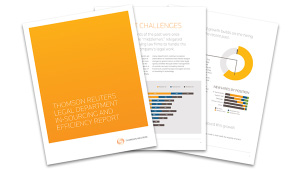The answer depends on the type of legal work. According to Thomson Reuters research, corporate legal departments usually send complex work that requires subject-matter expertise to outside counsel, in these percentages:
- 68% litigation/disputes
- 41% mergers & acquisitions
- 29% intellectual property
- 27% alternative dispute resolution
The trend is clearly to keep more legal work in-house
Like businesses everywhere, corporate legal departments are expected to do more with less. Fully half of the departments said this was their greatest challenge. Unsurprisingly, the majority told us they are moving more work in-house to have more control and visibility over costs.
Our report – A Look Inside: 2015 Thomson Reuters Legal Department In-sourcing and Efficiency Report – gives a powerful snapshot of this historic shift. Read the report and view the complete infographic here.
The report underscores that the traditional law firm model is under siege, with the balance of power shifting from law firm to legal department.
Other key takeaways in the 2015 Report
- 76 percent of the departments are using technology to drive efficiencies, particularly for document management, legal holds and matter management.
- While many law firms continue to reduce their workforce, many corporate departments are in a hiring mode to meet the growing workload.
Corporate legal departments have new options for handling the work
If your company is considering moving more work inside, you have more choices than ever for managing the budget, process and workload. They include contract lawyers, document review services, managed legal services, online-only legal services, independent consultants and hybrids combining some or all of the above.
Thomson Reuters Forum, our thought-leadership publication for legal professionals, covers the wide range of options available to in-house departments.
Read more at A Look Inside: 2015 Thomson Reuters Legal Department In-sourcing and Efficiency Report



